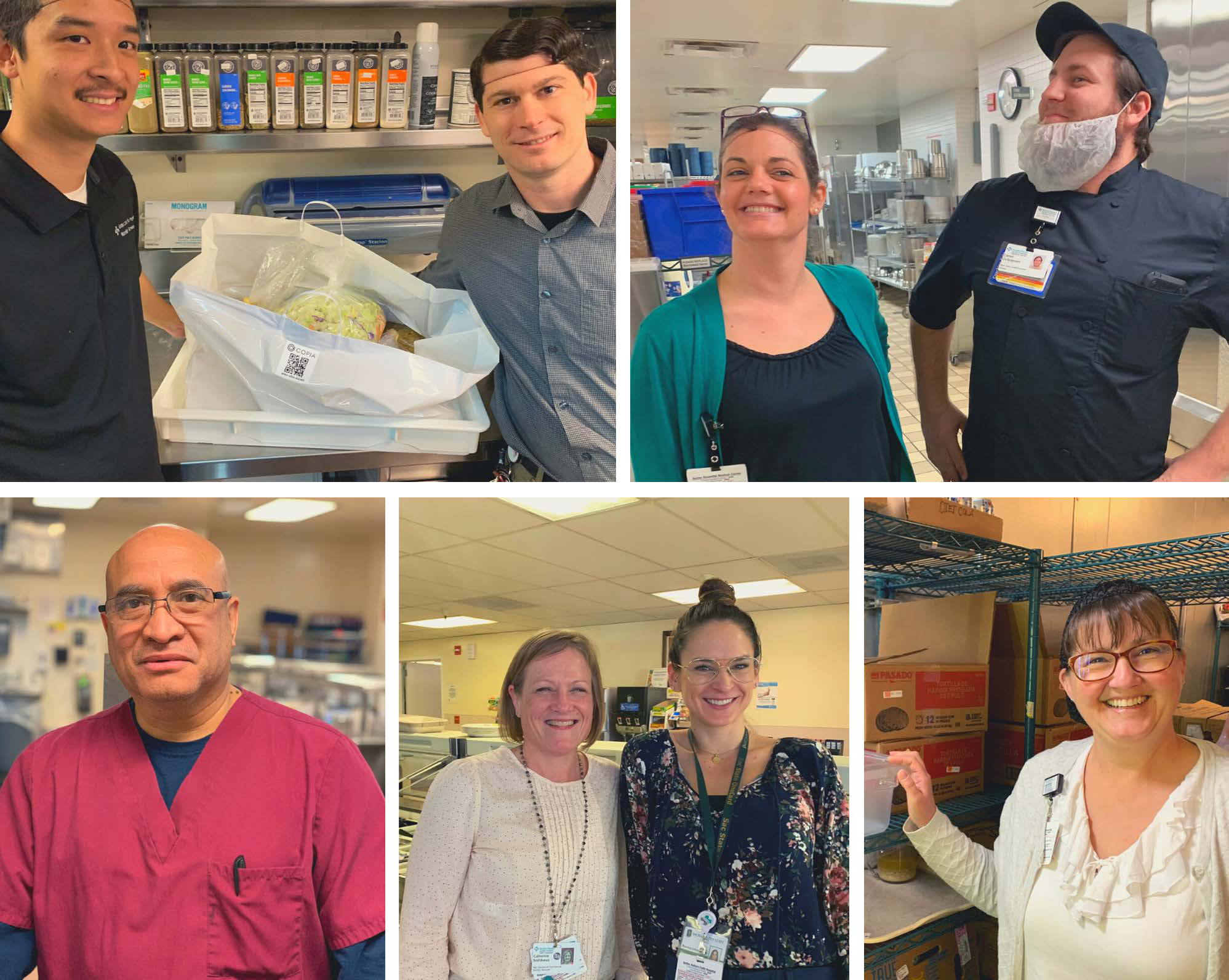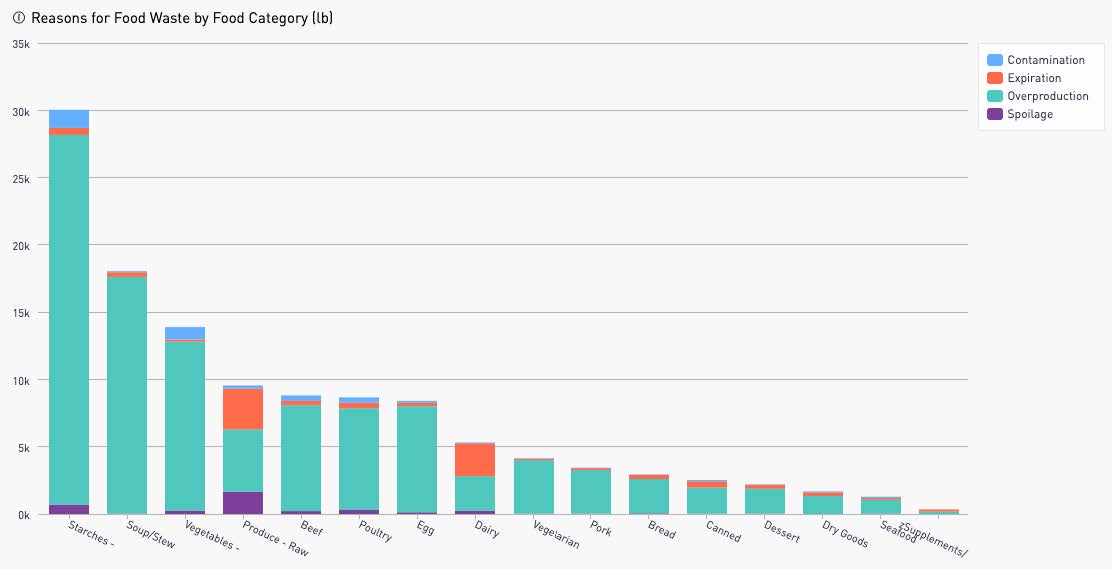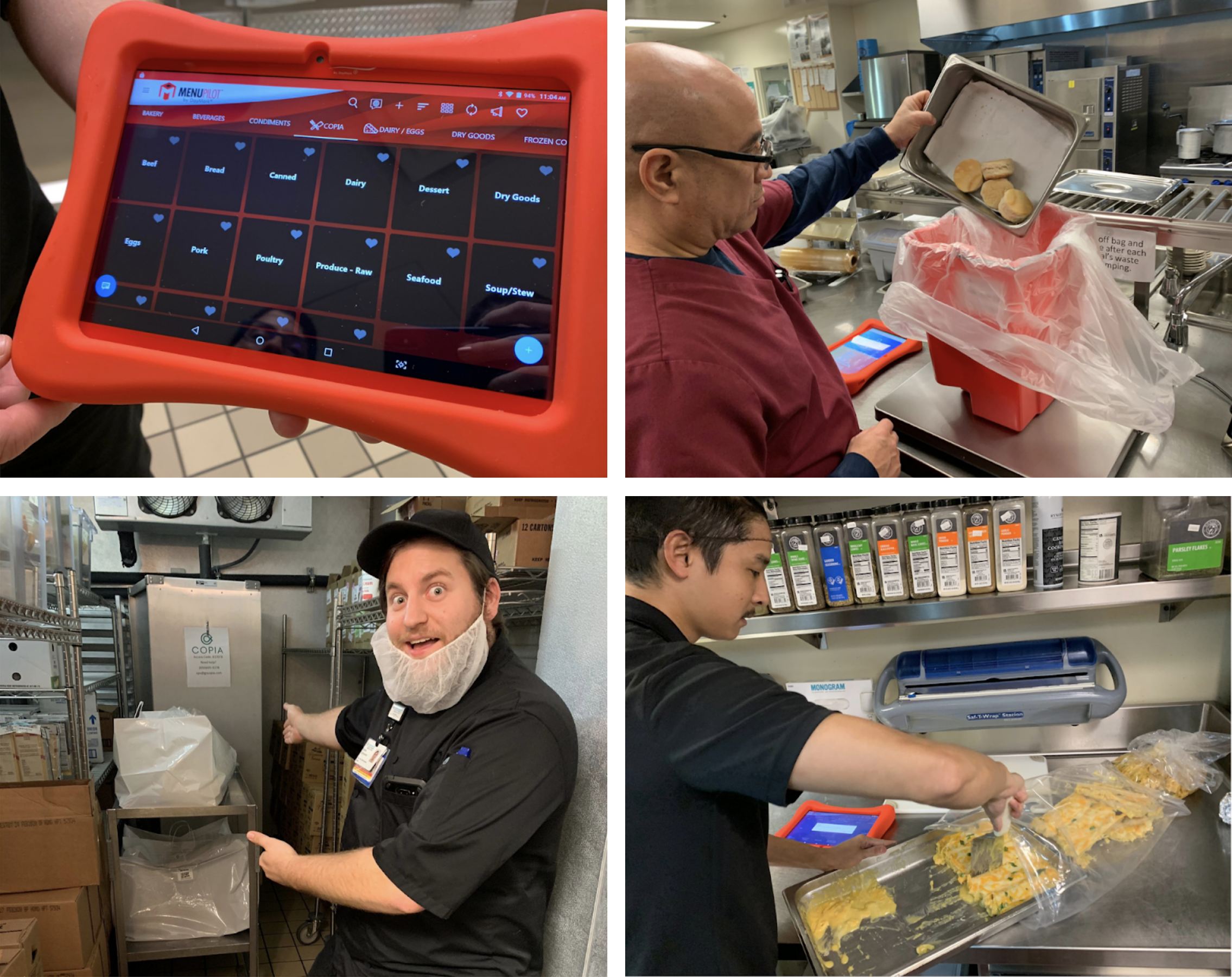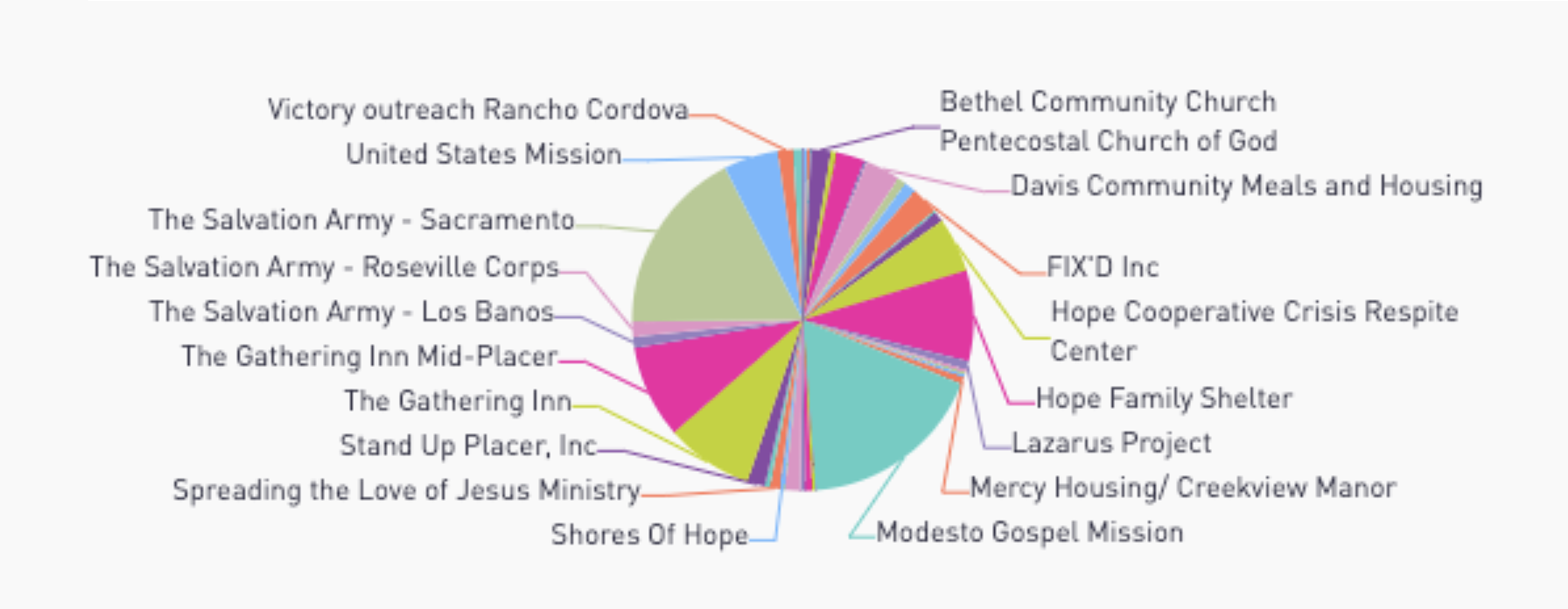“Not only does this project impact greenhouse gasses from keeping food waste out of the landfill, it is also about dollars saved, which is important to hospital administrators, and then there is the food rescue piece which is what is really important to our community.”
– Jack Breezee, Sutter Health regional director of food and nutrition services
 |
The challenge
Sutter Health food service staff knew food was going to waste in their kitchens, there was just no way to know how much was being wasted and why it was happening. They were also eager to donate any extra food they had to local organizations. In addition, the state of California had recently passed legislation to encourage and support food waste reduction efforts.
Sutter Health operates 10 hospital facilities in the Valley Region, which spans eight counties in Northern California. These facilities embarked on a 14-month food waste prevention and edible food donation pilot program using a food tracking and donation technology platform.
The objectives of the program included understanding the current landscape of California hospital food waste prevention and rescue projects, implementing the pilot at 10 Sutter Health facilities, and disseminating the research and pilot findings within the Sutter Health system and to health care networks in California and nationally. This pilot was funded by CalRecycle’s Food Waste Rescue and Prevention Grant program.
The solution
Sutter Health was primed and ready to begin in January 2020 at the pilot kick-off. Jack Breezee, the regional director, had been working with the directors at the 10 pilot facilities to outfit the kitchens with the proper equipment (scales, tablets for the app, bags for donations) and provide the kitchen staff with the training and motivation needed to take on reducing wasted food.
“Every kitchen should definitely do it. If you don’t know what you are wasting then you are just wasting. If you know where, when, and what you are wasting, you are able to run your kitchen much better. The staff can see what we were throwing away and are now donating to our local homeless shelter.”
– Food service manager, Sutter Solano Hospital
How Practice Greenhealth can help accelerate your food waste goalsHealth care is joining organizations across the country in the goal to reduce food waste by 50% by 2030.Our guidance and strategic planning, which aligns with the EPA food recovery hierarchy and evolving state and federal regulations, leads you through each strategy from source reduction to food donation to recycling, and will help you make a plan for achieving your waste reduction goals. |
Copia is a technology platform that helps food generators like hospitals track their wasted food and donate it to area nonprofit organizations. They provide a turnkey service that includes an app to log and donate excess food, logistics management with donation drivers who pick up the food (via DoorDash and Postmates), and onboarding and maintenance of the relationships with the organizations who receive the donated food (e.g., food banks, veteran’s homes, women’s shelters) who are on average less than 5 miles from the donors.
“All of these programs kind of fit together. We're here to talk about food donations, then all of a sudden, you're talking about composting, and you're talking about community benefit and food. Because it's all part of an informed way to operate.”
– Food service manager, Sutter Sacramento Medical Center
Sutter Health made the program their own, customizing the food categories to better align with their food purchasing. They also attached each food category to an associated cost, so that they could see the monetary impact of the food they were wasting. Copia then incorporated these categories into the app, which connects to a dashboard to allow Sutter Health teams to see how much food is wasted, in which categories, and for what reason (overproduction, spoilage, expiration, or contamination). The dashboard can inform food purchasing decisions, understand and address overproduction, and see the social and environmental impact of the program.
Food service staff place extra food on a scale, select the proper food category, and indicate whether the food will be donated, recycled, or landfilled). The app automatically captures the weight, date, and time. When they are ready to make a donation, they gather the bags and signal in the app to send a driver. Copia provides live operational support for managing donation logistics.
“The Copia system provided data transparency – lots of systems out there – this one actually categorizes all the waste in there, this many pounds of grain, this much protein, so we can really target where the overproduction was generated. Was it patient meals or a retail team? It gives us much more guidance so that the managers can make changes based on real data.”
– Food service manager, Alta Bates Summit Campus
Reasons for food waste by category


Challenges & lessons learned
Early in the pilot, a Sutter Health chef called into question the use of the term “food waste.” He said, “We do not donate waste to be eaten, we donate good healthy food. Who wants to eat a plate of waste?” This helped the team to rethink and redefine“food waste” streams altogether. Food is wasted but never a “waste.” Food is always a resource that does not belong in a landfill.
“This program really gives the opportunity to see what is happening on all levels. As a director, you have a sense, but this app allows you to really drill down and see and focus on different areas.”
– Food service manager, Sutter Auburn Faith Hospital
Food is edible or inedible, and it’s important to track both. One challenge for the Sutter Health teams was getting into the rhythm of tracking both edible and inedible foods daily. Inedible food should be minimized where possible and recycled.
Of the excess edible food generated in the pilot, 61% was donated. This highlighted an opportunity to ask “why.” There may be an explanation. For example, the recipient agency might not want three cups of oatmeal or large batches of white rice. Copia has a system to get feedback from the agencies about what is and is not working. One area for growth that the hospital staff identified throughout the pilot is to create a more direct relationship with the recipient agencies.
"I'm really supportive of this program. I used to volunteer to help feed the homeless. I'd think, there is so much food going to waste and all these hungry people. I don't mind giving a few extra minutes of my time to help people.”
– Food service staff member, Sutter Amador Hospital
Kitchen staff indicated that it does take some time to get into the flow of the daily tracking. However, in the first few months, just the process of paying attention to and weighing food reduced the overproduction problem. Weekly huddles and signage around the kitchen with the names of the organizations where the food was donated, were helpful motivators.
The COVID-19 pandemic hit in the first few months of the pilot, which impacted food volumes, cafeteria sales, hospital staff capacity, and the number of community partners in need. However, the goals of the grant were largely met and Sutter Health staff felt that the program was even more important in a time of unprecedented loss and upheaval.
The results
- During the pilot, participating Sutter Health facilities donated almost 65,000 pounds of food to more than 40 area nonprofits within 5 miles of each of the facilities.
- Sutter Health’s food waste prevention and rescue program reduced 283,000 pounds of carbon dioxide from being emitted.
- The early success of the pilot led to the expansion of the program to six additional facilities within the health system
Food donations can help our neighbors
The participating Sutter Health facilities donated almost 65,000 pounds of food to more than 40 area nonprofits. The early success of the pilot led Sutter Health to expand their food recovery program to six additional facilities within the health system.
We received our first food donation and we are very happy with it. It was nice to have the fresh produce to go along with our meals. The response was so quick as well. It was very useful for our organization and the families we are delivering food to. We have been delivering school lunches to our youth and now we are able to help the parents as well. This is really helping to make a great impact in our community. Thank you so much!
– Nexus Youth and Family Services, a pilot recipient agency
Nonprofits served

Food recovery can mitigate climate change
Over the course of the pilot, Sutter Health’s food waste prevention and rescue program reduced 283,000 pounds of carbon dioxide from being emitted.
“The biggest thing is that it is the right thing to do. Otherwise perfectly good food is going to the landfill or the compost. Also to not be contributing to greenhouse gases is a really big benefit and makes you feel good about the work you are doing.
– Food service manager, Sutter Center for Psychiatry
Hospital and kitchen staff are motivated by many things, including cost savings, meals served to their community organizations, and environmental benefits like reducing greenhouse gas emissions and saving water. The feedback from the project and the data from the Copia dashboard is a motivating factor to make changes every day.
From pilot to policy
Since the pilot, 16 Sutter facilities have continued their food waste reduction program. They’ve donated 82,339 pounds of food as of August 2022. They have also started waste forecasting at two of their facilities which will facilitate greater impacts through source reduction.
“From our earliest days, Sutter Health’s network has provided access to high-quality, affordable medical care in our facilities – but we’ve also been deeply invested in the health and wellbeing of our broader communities. The teams behind this project are putting our values into action by leveraging innovation to not only reduce our environmental footprint but also help feed community members in need.”
– Dr. Stephen H. Lockhart, Sutter Health chief medical officer
About Sutter Health
Sutter Health is a not-for-profit integrated health delivery system headquartered in Sacramento, California. It operates 24 acute care hospitals and over 200 clinics in Northern California. Sutter Health provides coordinated care to more than 3 million Californians. Their integrated network has created a connected model of care that is delivering coordinated health care when, where and how people need it. They are committed to ensuring health care is accessible and inclusive to all by offering comprehensive services and quality health programs tailored to the diverse communities they serve.






